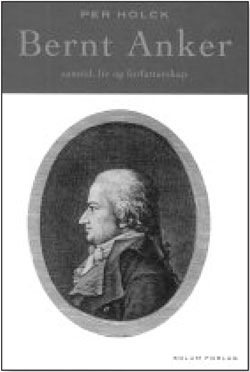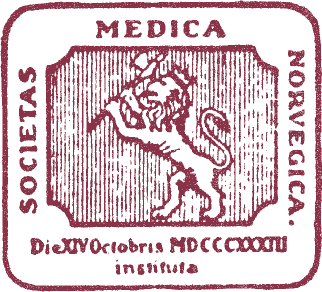Book review:Wealth and values – On the life and fate of Bernt Anker (1746–1805)
Michael 2006;3:69–72.
Holck P. Bernt Anker – samtid, liv og forfatterskap. Oslo: Solum, 2005. 183 pp. ISBN 82–560–1505–5. Price: NOK 289,00.

Studies of topics from the last decades of the 18th century Nordic countries are often puzzling. Like in greater parts of Europe at the time, major changes took place in politics and culture. However, here in the Northern region the processes often became even more visible because of local circumstances. The case of Norway was quite special: Political decisions by the government in Copenhagen had led Denmark, then including Norway, into an unfortunate war with Sweden and Britain. The communications between Denmark and Norway were severely hampered. This isolation of Norway, lasting for years, became serious for the population. Foreign trade dried up, and when peace was restored, economic crises got a severe impact on daily life. Norway also faced major political changes, as the country loosened its ties to Denmark after the years of war, got its relative independence in 1814 and became part of a union with Sweden. The 19th century brought something quite new in nearly all fields, so new that many old structures simply fell apart. Norway shifted away from a traditional life where changes had been few and slow for a long time.
This book, written by professor of anatomy and physical anthropology Per Holck at the University of Oslo, deals with a quite peculiar person in the Norwegian capital of Christiania, the merchant, ship-owner and industrialist Bernt Anker (1746–1805). Anker was in the last decades of the 18th century the richest man of the city, his wealth exceeding almost everything thinkable at the time. His many sawmills, his forests, his estates and his ships employed thousands. Personally, he led a luxurious life in Christiania. At this time, the city faced the sea towards the Bjørvika bay in the east. Here, Bernt Anker was living in a palace at the seaside, built by his father Christian Anker (1711–1765) in 1744–1755 on the top of old storage vaults, and with a nice garden stretching out to the water.
As a businessman, his successes have to be seen in their context: Norway had no efficient banking system at the time, and much of his fortune was locked up in real estate. Swift and favourable trading and transactions added to his wealth. But often this type of making business required cash money, instantly available. Therefore he had to rely on a complicated system of credits given by business partners and other members of the local elite, which in turn earned money for their favours through interests and mutual services. An utmost attention was necessary all the time, in order to keep up with what was going on. In spite of his solid position, Bernt Anker had to be alert all his life to prevent bankruptcy, at the same time as maintaining the family façade by means of a life in luxury was both a social necessity and a requirement for enjoying the trust and credit he needed to promote his business. Scandals staining the family had to be avoided for any price, even if the cover-up could be extremely painful, as when he chose to pay the debts of his unfortunate brother Jess Anker (1753–1798).
Holck describes the life and achievements of Bernt Anker in a well written text. The reader learns about the background and is introduced to the small group of key families and persons who in fact constituted the informal leadership in Norway at the time. The rich young boy Bernt Anker had already at the age of 14 been to England to learn the language, and 1764–1768 he was travelling Europe on a «grand tour», leaving him with an intention to become a diplomat. However, his wealthy father died in 1765, and Bernt Anker had to return to Norway and take over the family company, which he for the first 16 years ran together with his mother.
Anker had also studied at the University in Copenhagen, and he had wide cultural interests, accompanied with a liking for the decadent upper class life he had experienced abroad. Christmas parties of ten days’ duration are only one example of his posh life-style, another the dinner given at his wife’s birthday on 28. May 1793, where the friend, business-partner and distant relative John Collett (1758–1810) under his napkin at the table found an extraordinary gift: the signed transaction document for the large estate Ullevål outside the capital.
A biography on Bernt Anker may emphasise different traits of his work and personality, e.g. his efforts to introduce a national banking system in Norway. Holck, however, has highlighted the cultural sides of his life. Bernt Anker promoted the establishment of a national university; in his palace were given lectures on scientific topics, he was instrumental in the establishing of a theatre in the city, he was writing plays for the stage and even took over parts as an actor himself. Bernt Anker eagerly pursued also other values of life than wealth.
Bernt Anker had ambitions as an author, as a man of letters. He left behind many manuscripts, meant to be published after his death. He appears to the modern reader as a sort of renaissance person, yet closely linked to a society of the ancien régime.
Perhaps Bernt Anker’s ties to his time were part of the explanation for what happened later, when society had changed. Prior to his death at the age of 59 in 1805, his health was failing, As a widower from 1801 he felt lonely. Attempts to find a second wife were unsuccessful, despite his wealth and position. He did not fit into society anymore as good as he did before. Perhaps he also experienced some mental problems. However, he had written a detailed will where one of the main points was that his company should be kept running in his own spirit also in the future.
But times and people changed. The general economic turmoil in society hurt the business severely. The international market for the main export product, logs, lumber, boards and planks of high quality, failed. Combined with the effects of the weak leadership exerted by his successors, an incident put a full stop for the once so flourishing business empire: the great fire of 4. May 1819. The flames devastated all the lumber products which were piled up and were ready for exportation. And there was no insurance.
The people who had taken on to publish his writings did not follow the instructions in the will. It might be that the manuscripts did not keep up with the highest literary standards, but they might have shed more light on an interesting person and the social circles he belonged to. It is still not too late to make what still has been preserved in the archives, available to readers interested in this particular historical period by publishing his texts.
The palace, «Paleét» near the place where the main railway station later was built, was, according to the will, donated to public use. But soon the building went into decay, was used for different purposes and finally burnt down in 1942, allegedly put to fire by some bureaucrats who wanted to hide traces of economic irregularities when documents stored there were destroyed.
Bent Anker’s beautiful garden, bequeathed to the Cathedral School, soon became a wilderness.
Apart from the name of a street in what now is a more humble part of the city of Oslo, there are only few reminiscences back commemorating one of the really influential persons in the Norwegian society at the end of the 18th century. In many ways, memories of Bernt Anker have been lost.
Per Holcks discussion of this phenomenon is interesting reading, and has bearings beyond being only a biography of Bernt Anker.
Institute of general practice and community medicine
University of Oslo
p.o.box 1130 Blindern,
N-0318 Oslo, Norway
oivind.larsen@medisin.uio.no
